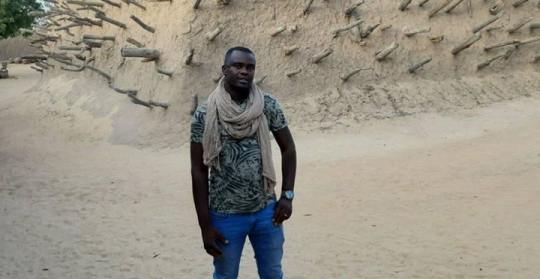|
Oumar Konaté and his band strike it hot on his latest release, I Love You Inna. This is the third studio album on Clermont Music for this young artist originally from Gao, Mali. He has worked with a wealth of Malian musicians and recruits Dramane Touré on bass, who is the former lead guitarist for the late Khaira Arby, and Makan Camara on drums and percussion to power the core of his trio. Ngoni, sabar, calabash, piano and monochord also add texture and fill out the arrangements. Konaté’s accomplished guitar work and substantial vocals serve as the driving force of this group.
Recorded in Bamako, I Love You Inna serves as a tribute to Mali, honoring loved ones and encouraging people to dance, while also addressing the enduring hardships Malians face. The set kicks off with the light-hearted “Houndia,” a song that praises the beauty of the women in Gao. The tight, cyclical guitar, bass and percussion patterns reveal the synergy in this band. Dramane Touré in particular ties the separate instruments together with his compelling basslines. The ngoni adds a nice bit of ambiance along with the violin that closes the piece.
The slow blues of “Oumar Bakoi” shows off Konaté’s passionate vocals. He sings directly to his fans, urging them to dance. The calabash added to the rhythm section provides a solid foundation for Konaté’s fluid guitar phrases. The title track features some wild guitar wails and sabar drumming that adds a tender element to this uptempo love song.
“Badje Bisindje” is a reflective song about sacrifice that adds piano to the mix and features a surprising jazzy turnaround. “Almounakaf” is a cool reggae tune with great ngoni and guitar passages. Konaté’s powerful voice warns the destructive forces that have come to Mali to leave immediately.
The second half of the album really shines. “Mariama” is a tender song with ngoni and violin about a wife being able to trust her new husband. “Koima Djine” gives another taste of the fire this group has in them. The song calls out to the genies of Koima for much-needed rain. Konaté’s vocals and guitar phrases are executed with ferocity. Touré’s bass playing is constantly active and Camara delivers a strong performance behind the drum kit.
“Ni Tchilla Sibara” is a full rock tune with heavy distortion on Konaté’s guitar. The attitude reflects the subject matter of realizing one’s own self-importance. “Zankai Hora” is a standout track that shows off the skills of the band and encourages children to dance. The infectious groove pushes the tempo up and adds ngoni to a substantial number that will have everyone moving.
The album closes with the excellent “Wa Toto,” a song that urges Malians to rebuild their country. Again the band is in top form. Touré is rewarded with a fine bass solo and Konaté’s encouraging vocals push the band ahead with Camara’s dynamic drumming. Konaté and his band have made a statement with this record that draws on the greats of the past but pushes Malian music towards the future with grit and determination. - Alex Brown
|
